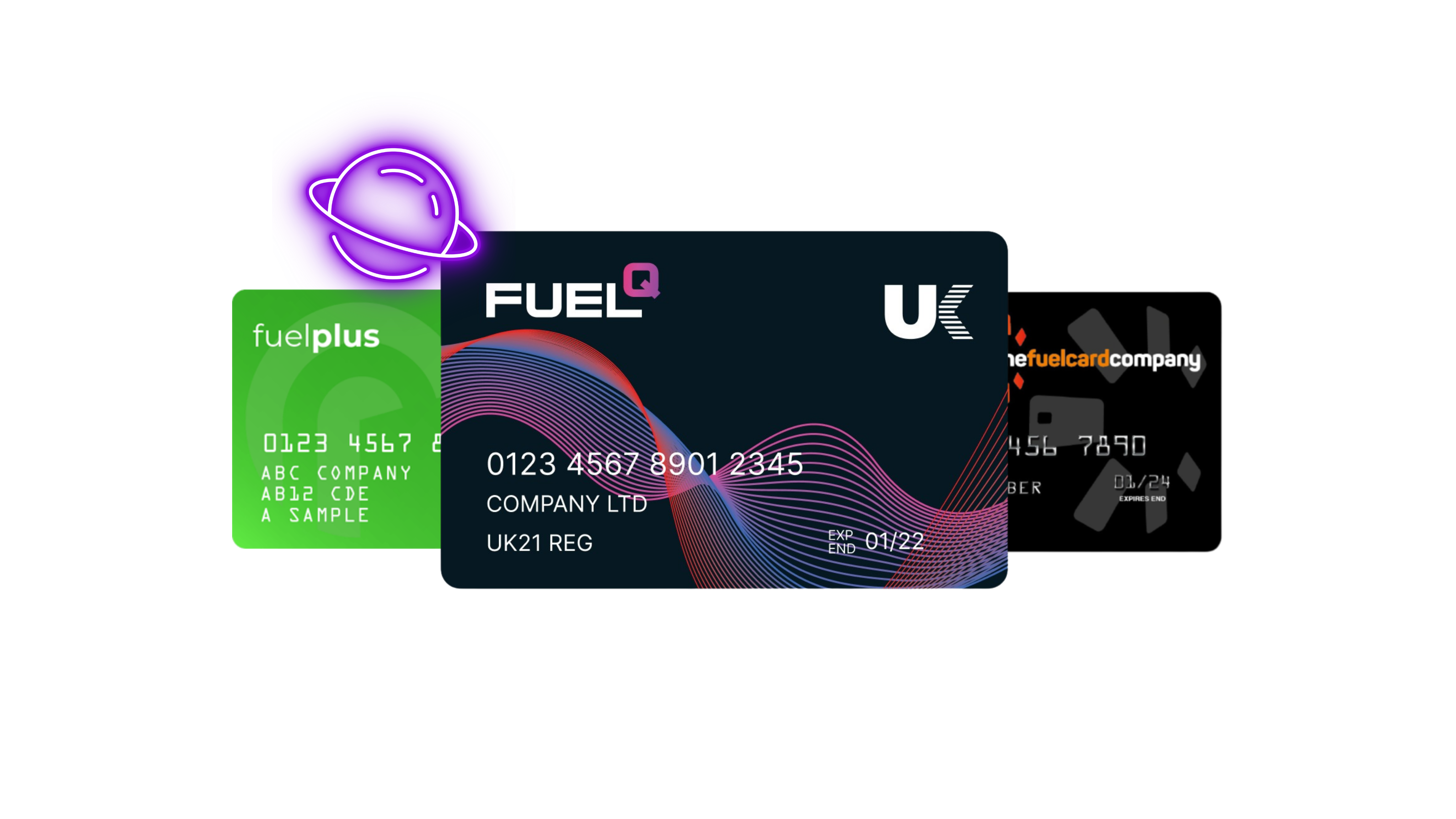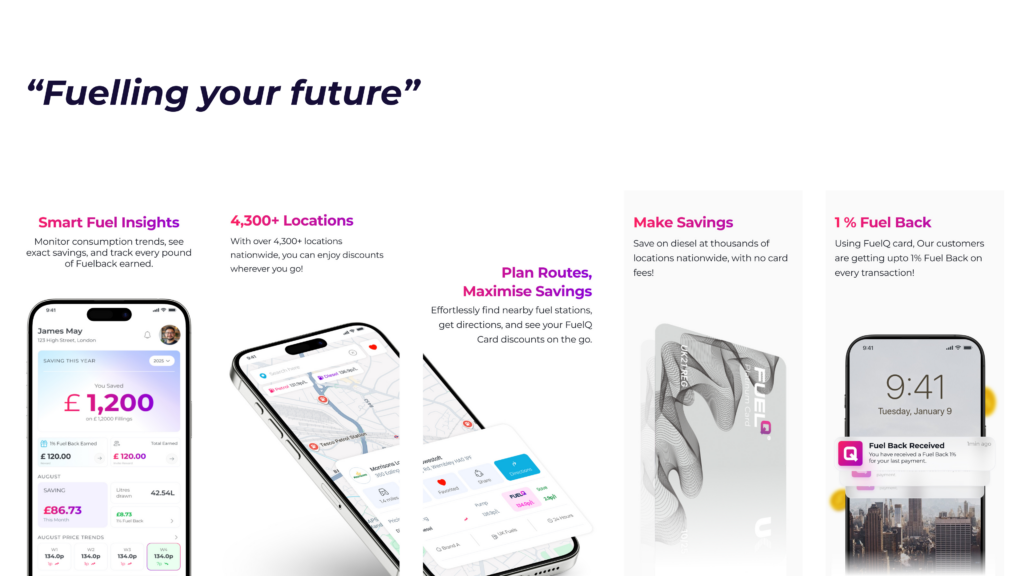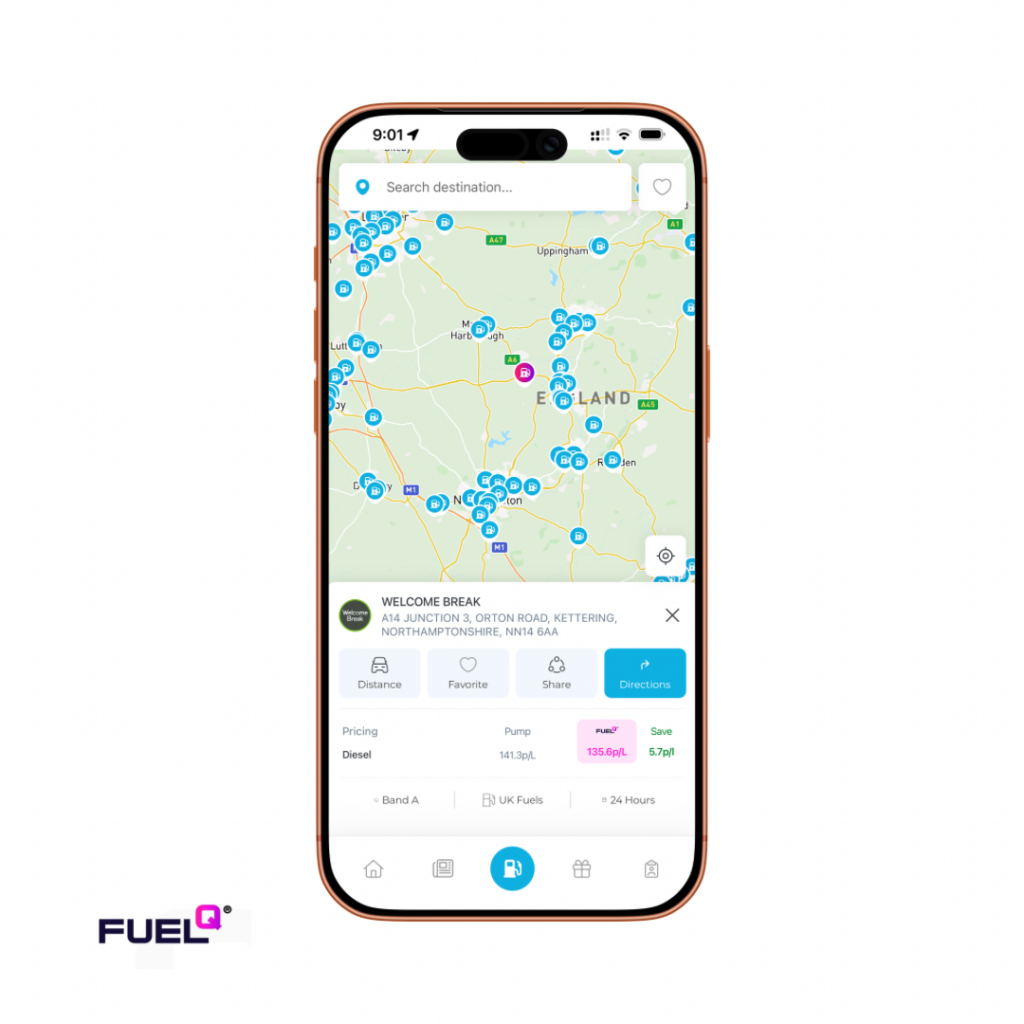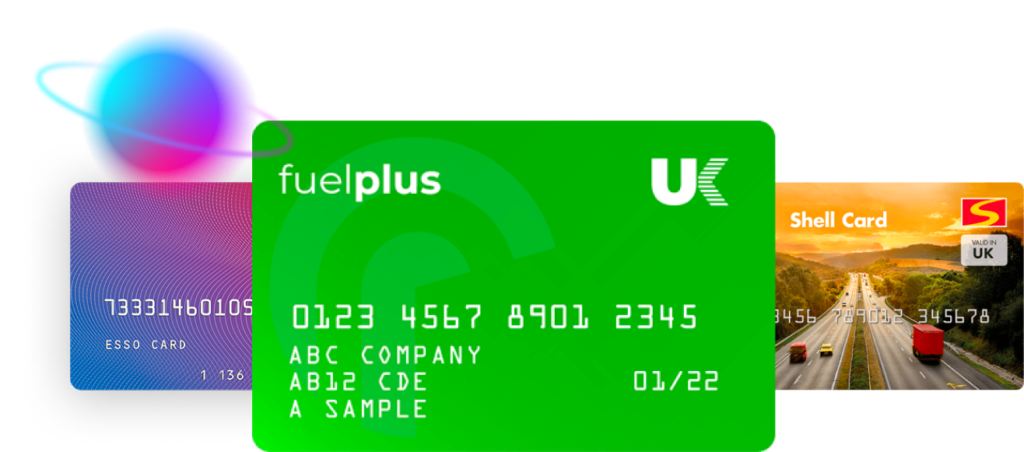If you’re an SME owner researching fuel cards, you’ve probably been contacted by multiple suppliers, each claiming to offer the “best deal” in the market. The reality is more complex – and that’s exactly why most business owners find choosing a fuel card supplier so frustrating.
The UK fuel card market has been dominated by several legacy players for decades, each with different networks, pricing structures, and approaches. Understanding these differences is crucial because the wrong choice could cost your business thousands annually, while the right one transforms your fuel management entirely.
Here’s your complete guide to who’s who in the UK fuel card market, what makes each supplier different, and why FuelQ’s approach delivers better results for SME businesses.
The Major Players: Understanding Your Options
UK Fuels (Part of Radius Group)
UK Fuels has been around since 1990 and is now part of the larger Radius Group. They’re one of the biggest names in commercial fuel cards, with a network covering over 7,200 sites across the UK including major brands like BP, Texaco, Esso, Shell, and supermarket chains.
Their strengths: Extensive network coverage means your drivers can fuel up almost anywhere. They offer competitive diesel discounts, typically up to 10p per litre on their network. Their online portal, Radius Velocity, provides comprehensive reporting and vehicle tracking capabilities.
Best suited for: Medium to larger fleets that prioritize network coverage and don’t mind working within an established corporate framework. Businesses that value mature infrastructure and comprehensive fleet management tools.
The catch: Legacy systems can feel dated compared to modern alternatives. Pricing structures can be complex with various fees and charges that aren’t always transparent upfront. Customer service often feels corporate and impersonal, especially for smaller accounts.
Allstar (Part of CORPAY)
Allstar claims the UK’s largest fuel card network, covering over 90% of UK fuel stations. They’re owned by CORPAY, a global payment solutions company, which gives them significant financial backing and technological resources.
Their strengths: Massive network reach with access to major fuel brands and supermarket sites. They offer up to 8p savings on diesel through their exclusive Discount Diesel network. Strong technology platform with mobile apps and detailed reporting. They also offer business credit cards and EV charging solutions.
Best suited for: Businesses that want one-stop-shop fuel and business payment solutions. Companies planning transition to electric vehicles will appreciate their EV charging network access.
The reality: Large corporate structure means decision-making can be slow and account management impersonal. Pricing isn’t always as competitive as they claim once you factor in all fees and charges. Their size means smaller businesses often don’t get the attention they deserve.
KeyFuels Network
KeyFuels operates a bit differently, they’re more of a network that multiple fuel card companies use rather than a direct supplier to end customers. However, some businesses do get KeyFuels-branded cards through various intermediaries.
Their approach: Focus on independent fuel sites and truck stops, which can offer very competitive pricing, especially for HGV and commercial vehicle operators.
Best for: Businesses with larger vehicles or specific route requirements where independent sites offer better value than major brand forecourts.
The limitation: Smaller network than the major players, so not ideal if your drivers need fuel flexibility across diverse locations.
Shell and BP Fuel Cards
Both major oil companies offer their own fuel cards, typically focused on their own forecourt networks with some reciprocal arrangements.
The appeal: Direct relationship with fuel giants, often good integration with loyalty programs, and sometimes competitive pricing at their own sites.
The problem: Limited to primarily their own networks, which restricts driver flexibility. Pricing isn’t always as competitive as independent card providers who negotiate across multiple networks. You’re essentially locked into one fuel brand.
Regional and Specialist Providers
There are dozens of smaller fuel card companies, many focusing on specific regions or vehicle types. Some offer very competitive pricing but may have limited networks or basic technology platforms.
Start saving now by applying for a FuelQ card in minutes.
The Problem With Traditional Fuel Card Providers
Here’s what most established fuel card companies have in common: they were built in the 1990s or early 2000s, designed for a different era of fleet management. Their systems, processes, and pricing structures reflect this legacy approach.
Complex pricing structures: Multiple fees, transaction charges, monthly account fees, and opaque discount calculations make it difficult to understand what you’re actually paying.
Legacy technology: Clunky portals, basic mobile apps (if they exist at all), and reporting systems that feel outdated. Many still rely heavily on phone and email for customer service.
Corporate bureaucracy: Large organizational structures mean slow response times, impersonal service, and difficulty getting attention for smaller accounts.
Hidden costs: What looks like a great discount rate often comes with administration fees, minimum transaction charges, and other costs that erode the headline savings.
One-size-fits-all approach: Products designed for large fleets don’t translate well to SME needs. You’re forced into solutions built for different business types.
The result? Many SMEs are using fuel cards that deliver mediocre value, poor user experience, and frustrating service, simply because that’s “how fuel cards have always been done.”
Why FuelQ Does It Differently
FuelQ was built from the ground up to solve the problems SMEs actually face with fuel cards. We’re not a 30-year-old company trying to modernize legacy systems. We’re a new generation provider designed specifically for today’s business needs.
1. Transparent Pricing That Actually Makes Sense
No hidden fees. No complex discount calculations. No surprise charges.
With FuelQ, you see exactly what you’re paying in real-time through our mobile app. Our prepaid and credit fuel card options both feature straightforward pricing: competitive fuel rates at over 4,300 UK locations, with savings up to 10% on diesel at our exclusive network sites.
The industry first: 1% Fuel Back rewards on all purchases. Not complicated loyalty points that take years to accumulate. Not discount tiers that require massive volumes. Just 1% back on every litre, every time.
Traditional providers quote headline discount rates but bury them in terms and conditions. We show you the actual price you’ll pay before your driver fills up.
2. Modern Technology Built for How You Actually Work
Our native mobile app (launching soon) isn’t a bolt-on to 20-year-old systems. It’s built with modern technology to give you real-time visibility and control.
Real-time transaction notifications: See every fuel purchase instantly, not days later in a monthly report.
Location-based pricing: Your drivers can see fuel prices at nearby stations before they pull in, helping them choose the best value option.
Instant spending controls: Set limits, freeze cards, adjust budgets – all from your phone, taking effect immediately.
Intelligent reporting: Get insights that actually help you manage fuel costs, not just data dumps that require hours to analyze.
Compare this to traditional providers where you’re logging into clunky web portals, waiting for overnight batch processing, and calling customer service to make simple account changes.
3. Prepaid and Credit Options for Different Business Needs
Not every business wants or needs a credit facility. Traditional providers force most customers into credit arrangements with credit checks, personal guarantees, and lengthy approval processes.
FuelQ Prepaid: Perfect for new businesses, those managing cash flow carefully, or companies that prefer simple budget control. Top up your account, use your cards, no credit checks required. Complete control over spending.
FuelQ Credit: For established businesses that want the convenience of monthly billing with competitive credit terms and none of the bureaucracy of traditional providers.
Both options give you access to the same network, same pricing, same technology, same service.
4. A Network That Actually Covers Where You Drive
4,300+ locations across the UK including major brands and independent sites. We’ve built our network to balance coverage with value – you’re not paying premium prices for brand names when a quality independent site offers better rates on your route.
Our exclusive partnership sites deliver the biggest savings (up to 10% on diesel) while our broader network ensures your drivers are never stuck hunting for an accepted location.
5. Service That Treats Your Business Like It Matters
When you call FuelQ, you speak to people who understand SME challenges because we’re an SME ourselves. No call centers. No ticket systems. No “your account manager will get back to you in 3-5 business days.”
We’ve built partnerships with organizations like Motorsport UK, Halfords, and Bridgestone because we deliver genuine value and service – not because we’re the biggest or oldest provider, but because we’re the best at what we do.
6. Pricing That Competes (and Wins)
Here’s the reality: we’re competing against companies with decades of market presence and established customer bases. That means we have to offer better value to earn your business.
We do this through:
- Modern, efficient technology that costs less to operate than legacy systems
- Direct relationships with fuel networks without layers of intermediaries
- Lean operations focused on service quality over corporate overhead
- Passing savings to customers rather than maximizing margins on captive accounts
The result? Pricing that genuinely competes with or beats traditional providers, plus rewards and features they don’t offer.
How This Plays Out in Practice
Traditional provider approach: You contact UK Fuels or Allstar. Sales rep quotes impressive headline savings. Sign a contract with 60+ pages of terms and conditions you’ll never read. Receive cards 2-3 weeks later. Discover actual pricing includes various fees not mentioned in initial conversations. Spend months trying to get through to account management when you need changes. Wonder if you made the right choice.
FuelQ approach: Apply online in minutes. Prepaid option? You’re approved immediately – top up and start saving today. Credit option? Fast decision, none of the corporate bureaucracy. Receive cards within days. Download the app, see every transaction in real-time. Need to adjust something? Do it yourself instantly or reach our team directly. Get 1% Fuel Back automatically. Know exactly what you’re paying and what you’re saving.
Real example: A local trades business moved from Allstar after two years of frustration with customer service and hidden fees. They thought they were saving 7p per litre but actual savings after fees worked out to about 4p. With FuelQ, they get transparent pricing averaging 8p per litre savings on their regular routes, plus 1% Fuel Back (another 1.6p per litre at current prices), plus no monthly account fees. Total benefit: over £1,200 annually, plus far better user experience.
What This Means for Your Business
Better economics: Transparent pricing and genuine rewards mean more money stays in your business rather than disappearing into fuel card provider margins.
Better control: Modern technology means you can see and manage fuel spending in real-time, not retrospectively through monthly reports.
Better experience: From application through daily use to customer service, everything is designed for simplicity and speed.
Better partnership: We’re building a business, just like you. We succeed when you succeed, which means we’re invested in delivering genuine value, not just locking you into a contract.
See the sites where you can use your fuel cards by downloading our app: fuelq.co.uk/our-app
The Questions You Should Ask Any Fuel Card Provider
Whether you’re speaking to traditional suppliers or new providers like FuelQ, here are the key questions that reveal whether you’re getting genuine value:
“What’s the total cost, including all fees?” Headline discount rates mean nothing if they’re eaten up by transaction fees, monthly charges, and other costs. Demand total transparency.
“Can I see real-time transactions or do I wait for monthly statements?” In 2025, real-time visibility should be standard, not a premium feature.
“How quickly can I make changes to my account?” If the answer involves calling someone and waiting days, that’s a legacy system problem.
“What happens if I find a better deal or my business needs change?” Understanding contract terms and exit flexibility is crucial.
“Do you actually reward customer loyalty?” Most providers offer deals to win new customers then take existing customers for granted. Look for providers that value retention through genuine benefits like FuelQ’s 1% Fuel Back.
Making Your Decision
The fuel card market is changing. The dominance of legacy providers built on 1990s technology and pricing models is being challenged by new entrants who understand modern business needs.
You don’t have to accept complex pricing structures, dated technology, impersonal service, and mediocre value just because “that’s how fuel cards work.” Those are characteristics of how legacy providers operate, not inherent features of fuel cards themselves.
Your business deserves:
- Pricing you can actually understand
- Technology that works the way you work
- Service that respects your time and intelligence
- Genuine value, not just marketing claims
Whether you choose FuelQ or another provider, the important thing is that you’re choosing based on what actually delivers value for your specific business, not just accepting the status quo because it’s familiar.
The Bottom Line
The UK fuel card market offers choices that can significantly impact your bottom line. The difference between choosing well and choosing poorly can easily exceed £1,000 annually for typical SME businesses.
Traditional providers built their businesses in a different era. They offer stability and established networks, but often at the cost of complexity, dated technology, and impersonal service.
FuelQ offers something different: transparent pricing, modern technology, genuine rewards, and service that treats your business with the respect it deserves. We’re not trying to be everything to everyone – we’re focused on delivering exceptional value to UK SMEs who want a better fuel card experience.
There isn’t one “best” fuel card supplier for every business. The best supplier for your business depends on your specific needs, priorities, and preferences.
What we can promise: if you value transparency, modern technology, genuine rewards, and personal service, FuelQ delivers. If you’re frustrated with your current provider’s complexity, hidden costs, or impersonal approach, we’ve built something better.
Ready to see how FuelQ compares for your business? Get your quote and start saving in minutes: fuelq.co.uk
Our customers are saving up to 10% per litre
On average our customers are seeing significant savings when they switch to FuelQ – up to 10% on diesel at our exclusive network sites, plus 1% Fuel Back rewards. You could be making those savings too, it only takes a few minutes to get a quote.





